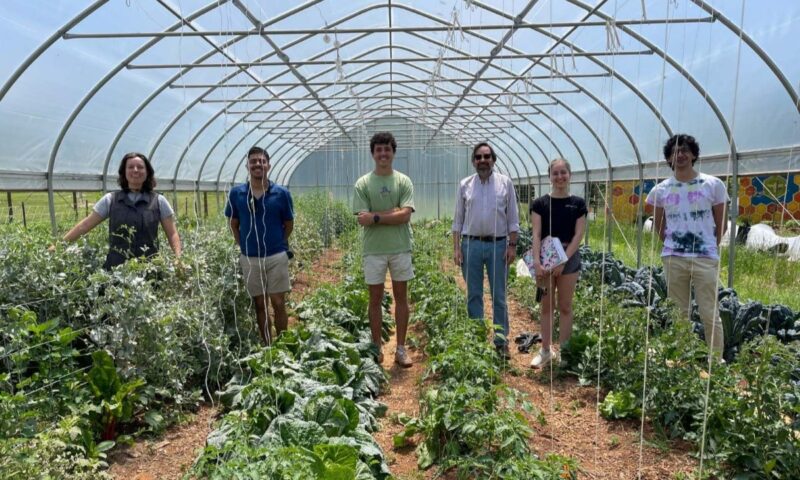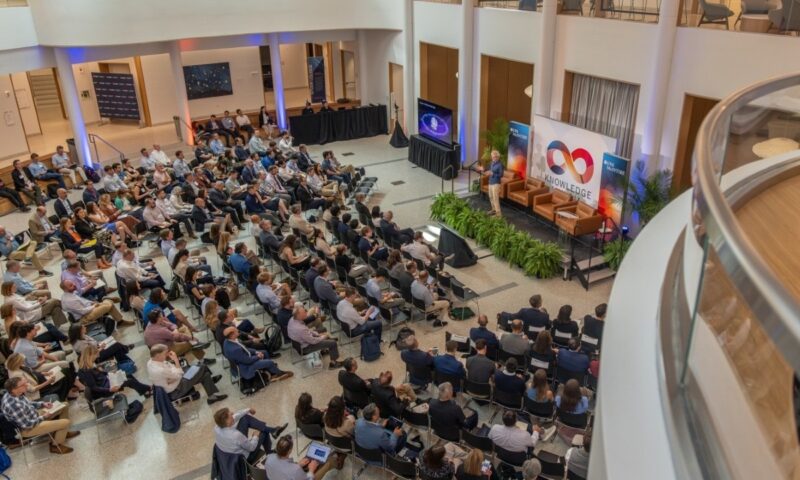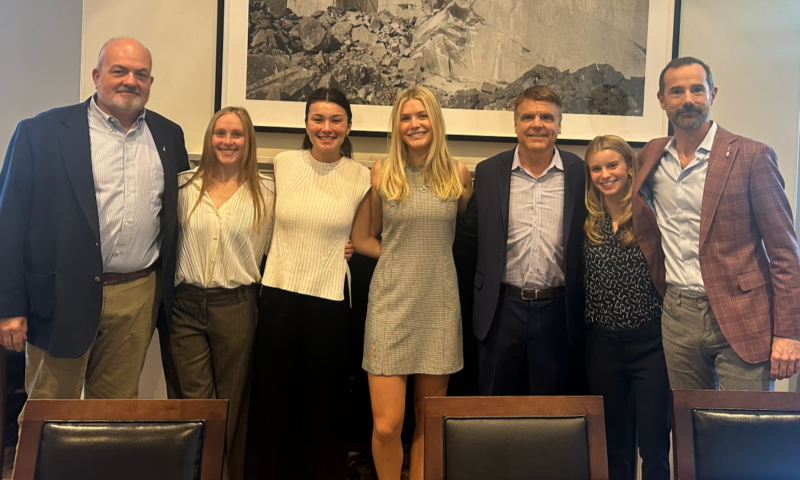
Members of the Ragged Mountain Running Shop project team after their final presentation. Photo provided courtesy of Mark Lorenzoni.
“Good with numbers? Fascinated by data? The sound you hear is opportunity knocking,” began a recent New York Times headline.
In this new age of big data and business analytics, students completing the Business Analytics Track at the University of Virginia’s McIntire School of Commerce can learn web and search analytics techniques and best practices in the undergraduate elective Electronic Commerce and Web Analytics. Through in-class instruction and lab sessions, students in the course are exposed to industry analytical frameworks, web mining technologies, and best practices for aligning analytics with business strategy.
The cornerstone of the course is a semester-long project in which student teams leverage the web and search analytics techniques learned in class, coupled with expertise provided by industry partners, to bolster the online presence of a small business or nonprofit. Two projects from the spring semester—for Progress in Education and Ragged Mountain Running Shop—exemplify how the class works.
Progress in Education
Progress in Education provides financial and educational resources to beleaguered secondary schools in Ghana. The charitable organization also promotes cross-cultural understanding between students in the United States and Ghana.
To help Progress in Education reach its goal of augmenting its online presence and expanding its donor base, a student team from the class redesigned the nonprofit’s website to increase traffic to important event-related content, including fundraising galas and a charity golf tournament. The improvements to the digital user experience, as well as an ensuing online paid search advertising campaign, generated impressive results, including:
- An 86 percent increase in overall website traffic and a 178 percent increase in the number of unique visitors
- An estimated return on ad spend of approximately $9 for every dollar spent on the paid search campaign, in terms of monetary donations
- Several first-time donors and some visitors who did not donate but provided contact information, thereby expanding the future potential donor base
Ragged Mountain Running Shop
Ragged Mountain Running Shop, established in 1982 near the Grounds of the University of Virginia, is an integral part of the University and Charlottesville communities. Although the specialty running store already had a major online presence before the project, owners Mark and Cynthia Lorenzoni expressed a desire to bolster their digital user experience and better communicate their core community-oriented mission.
Working closely with the Lorenzonis, a McIntire student team revised the Ragged Mountain website design by combining industry best practices for digital user experience; attaining customer data through clickstreams and surveys; and leveraging the owners’ extensive business intuition.
“We absolutely loved working with [McIntire] Professor Ahmed Abbasi’s students, as they totally immersed themselves in our project,” said Mark Lorenzoni. “From the start, they took it upon themselves to personally get to know as much about our Ragged Mountain family as possible. This gave them a leg up on enhancing the quality of our website.”
The new website emphasizes Ragged Mountain’s strong community ties and extensive social media presence. And because the analytics revealed that a growing number of customers were interacting with the website through mobile devices, the students made the new design and underlying technologies more mobile-friendly.
Based on qualitative feedback from the owners and customers, the revamped website was very well-received. Web analytics metrics also revealed quantifiable gains in customer engagement, including increased website traffic and increases in average time spent and average pages viewed per visit.
Having improved the digital user experience, the team turned their attention to further enhancing website traffic and attracting new customers using search analytics techniques. Analysis of historical search query data pertaining to Ragged Mountain Running revealed that one of the most common search keywords was “coupon.” Accordingly, the student team developed a paid search strategy that included a highly successful online coupon campaign.
Overall, the team’s paid search efforts attained impressive results:
- An overall click-through rate of 5.4 percent for the store’s search ads, more than twice the industry average
- An estimated return on ad spend of over $12 for each dollar spent
- The acquisition of several new customers
The students’ passion and hard work paid off, Lorenzoni said. “We now have a greatly enhanced website that, we feel, has led to a marked improvement in the sales and reputation of an already healthy 31-year-old established business.”
“Competing on Analytics” in the Google Online Marketing Challenge
The Google Online Marketing Challenge (GOMC) is the quintessential real-time analytics competition. In this annual event, which attracts thousands of entrants worldwide, teams are evaluated on their ability to improve online impressions, web traffic, conversions, and other key performance indicators for a client.
For GOMC, teams develop an online paid search campaign strategy for their client and then proceed to execute that plan over a three-week period using modest funding provided by Google. During the campaign, teams must constantly monitor, measure, analyze, and adapt their campaign settings and overall strategy. They must also develop a post-campaign report describing important outcomes. Both Google and an independent worldwide academic panel evaluate team performance.
This past spring, McIntire students competed in GOMC for the first time, along with approximately 2,500 teams worldwide. Based on the competition results, all six McIntire student teams finished in the top 15 percent worldwide, with the Progress in Education and Ragged Mountain Running Shop teams finishing in the top 7 percent.
The results lend credence to the types of high-quality analytics programs being developed at McIntire. “From day one, our students are taught to think analytically and to solve business problems using a systematic, highly rigorous, data-driven approach,” said McIntire’s Associate Dean for the B.S. in Commerce Trey Maxham, who also co-directs McIntire’s analytics programs with Abbasi.
Industry Involvement
The student teams were assisted by key industry partners, including comScore, The Rimm-Kaufman Group, and Search Mojo. comScore’s Media Metrix tool allowed the teams to better understand their target audiences’ demographics and online behavior. Search Mojo provided invaluable insights through presentations on search engine optimization best practices and one-on-one sessions in which analysts helped the student teams refine their online advertising campaigns. Rimm-Kaufman Group speakers discussed the intuition behind the company’s state-of-the-art search analytics, and also worked one-on-one with student teams to help bolster their paid search strategies.
Industry involvement played an integral role in enhancing the student learning experience, and in improving student project-related outcomes. As Abbasi noted, “McIntire has a longstanding tradition of incorporating industry thought leaders in our innovative undergraduate and graduate programs. The e-commerce and web analytics course is another example. We are greatly appreciative of the continued support and involvement of our industry partners.”
Bridging the “Analytical Divide”
According to industry research, over 97 percent of organizations with annual revenue in excess of $100 million take advantage of some form of analytics. Conversely, very few small businesses and nonprofits are able to leverage the power of analytics. While the reasons are manifold, one of the biggest obstacles is a shortage of available human resources with necessary analytical skills. However, with a greater focus on developing analytics-oriented coursework at top institutions such as UVA, class projects and independent studies provide an excellent opportunity for students to gain hands-on skills and real-world experience while helping to improve the bottom line of small businesses and nonprofits.
“Working on this project was an invaluable experience,” said Ragged Mountain Running Shop project team member Adam Rizzo (McIntire ’13). “Our team was accountable to someone else other than ourselves, and understanding the store’s goals was the key to building a successful and mutually beneficial relationship. Because of this, we were able to improve the store’s online presence in a way that fit its brand.”
By Mary Summers Whittle


